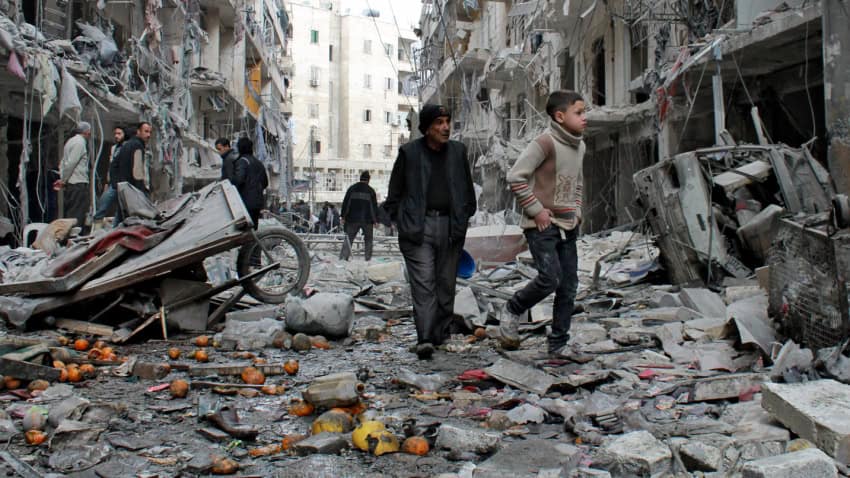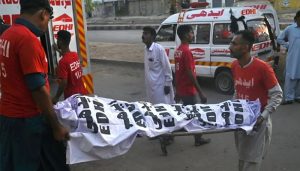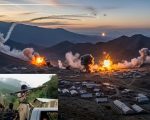The United States and Russia are backing a cessation of hostilities agreement in war-torn Syria which has been accepted by most of the parties involved in the conflict. This is the second ceasefire plan recently which calls on the warring parties to stop fighting but specifically excludes the Islamic State and the Al Qaeda franchise Al Nusra Front. This time there is lot of expectations from this agreement as Russia and America have agreed to act as direct guarantors and monitors of the cessation of hostilities. The agreement states violations of the ceasefire will be reported on a hotline to a special task force co-chaired by America and Russia which will have power to determine a group can no longer be deemed party to the agreement, and so once again open to military attack. This assurance from two global superpowers has raised the hope for success of this agreement between different warring parties and Syrian government. Moreover this agreement endorsed by both US and Russia states that. All opposition groups signing up to the ceasefire will not only cease to use weapons or to gain territory, but also allow “rapid safe and unhindered” access to humanitarian convoys in areas under their control. If this is implemented well on the ground it will act as the major relief and lifeline for Syrian civilians trapped in the besieged areas.
If monitored well and adhered to, this agreement will not only lead to a decline in violence, but also support a political transition to a government that is responsive to the desires of the Syrian people. But still questions has been raised on this agreement like- Some Syrian opposition forces said the exclusion from the agreement of the al-Qaida-linked Nusra Front was problematic because it could be used as a pretext for attacks on rebel groups and civilians in opposition-held areas. It was pointed out that al-Nusra is not only present in Idlib, but also in Aleppo, in Damascus and in the south in association with moderate rebel forces. But to avoid this kind of attacks from Syrian government the moderate opposition should totally alienate themselves from Nusra Front. Because the Syrian moderate opposition has to understand that being a partner with Nusra Front even on limited fronts will harm their credibility and image. So this is the best time to abandon Nusra. The Syrian conflict is on the verge of resembling a mini-World War III. Since World War I, never have as many actors with rival agendas and operations been involved in a conflict as they are in that of Syria. If this conflict is not contained and resolved soon, it carries the potential to result in direct military clashes, either by accident or by design, between some of the main regional and international actors, with horrendous global ramifications. Moreover US Secretary of State John Kerry recently said it would be hard to hold the country together if the fighting did not stop.
So every party involved in the conflict has to understand that there is no military solution and only one thing which can work is talks and negotiations. First thing which is required for any meaningful dialogue which can lead to any kind of political solution is cessation of fighting on the ground. This cessation of hostilities will also closely affects Syria’s neighborhood, most notably Turkey. The Kurdistan Worker’s Party armed wing YPG has announced that it will abide by the cessation of hostilities. Turkey, as a member of the International Syria Support Group, is also expected to buy into and abide by the cessation of hostilities. So this agreement can also lead to drop into violence between Turkey and Syrian Kurds which are in conflict after Turkey airstrikes on YPG recently. One thing that should also be taken into consideration is that a key part of the agreement is full implementation of U.N. Security Council Resolution 2254, which states “including the readiness to participate in the U.N.-facilitated political negotiation process”. The resolution calls for the government and the opposition to start formal negotiations on a political transition aimed at establishing “a credible, inclusive and non-sectarian governance. So this agreement is the first step in direction of formal peace talks.
Members of the 17-nation group backing Syria’s peace process are to meet in Geneva Friday to work out further details of the agreement, which is then expected to be endorsed by the UN Security Council. There are a hopes a successful ceasefire will lead to the resumption of peace talks that collapsed in Geneva earlier this monthMembers of the 17-nation group backing Syria’s peace process are to meet in Geneva Friday to work out further details of the agreement, which is then expected to be endorsed by the UN Security Council. There are a hopes a successful ceasefire will lead to the resumption of peace talks that collapsed in Geneva earlier this monthMembers of the 17-nation group backing Syria’s peace process are to meet in Geneva Friday to work out further details of the agreement, which is then expected to be endorsed by the UN Security Council. There are a hopes a successful ceasefire will lead to the resumption of peace talks that collapsed in Geneva earlier this monthImmediately following the formal cease-fire, the United Nations would convene all of the Syrian factions that accepted the plan to begin negotiating on the future of a unified Syrian state. Than a comprehensive political framework can be work out that includes reform of Syrian institutions, formation of a new government, the identification of “terrorist groups” and a plan for elections. At this point, almost any peace plan would be better than the current war. Every proposal is not without its challenges, downsides or risks. But it would be far better than the status quo and more practical than any of the other alternatives. This agreement paved the way for a more durable ceasefire and resumption of peace talks which can lead to a better future for Syria and its people.














